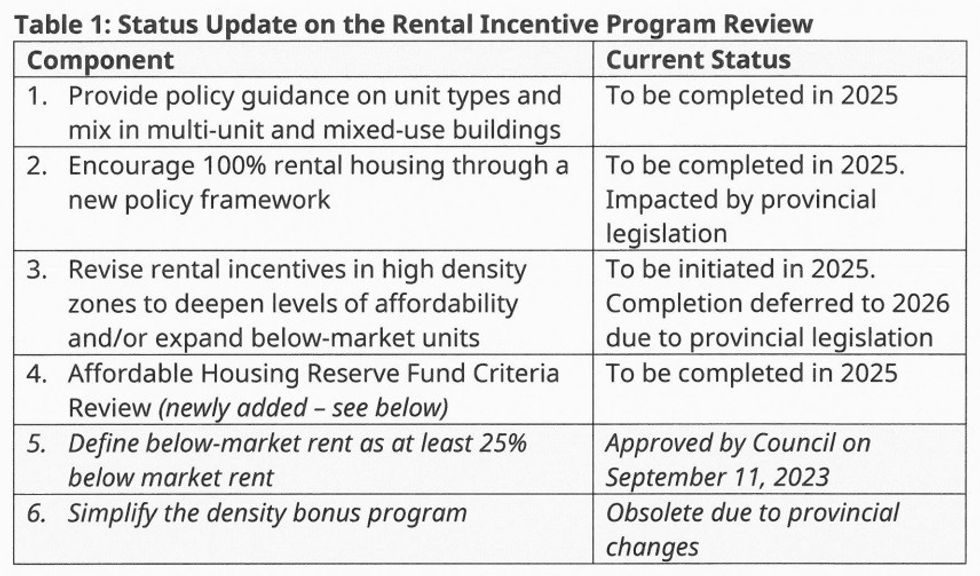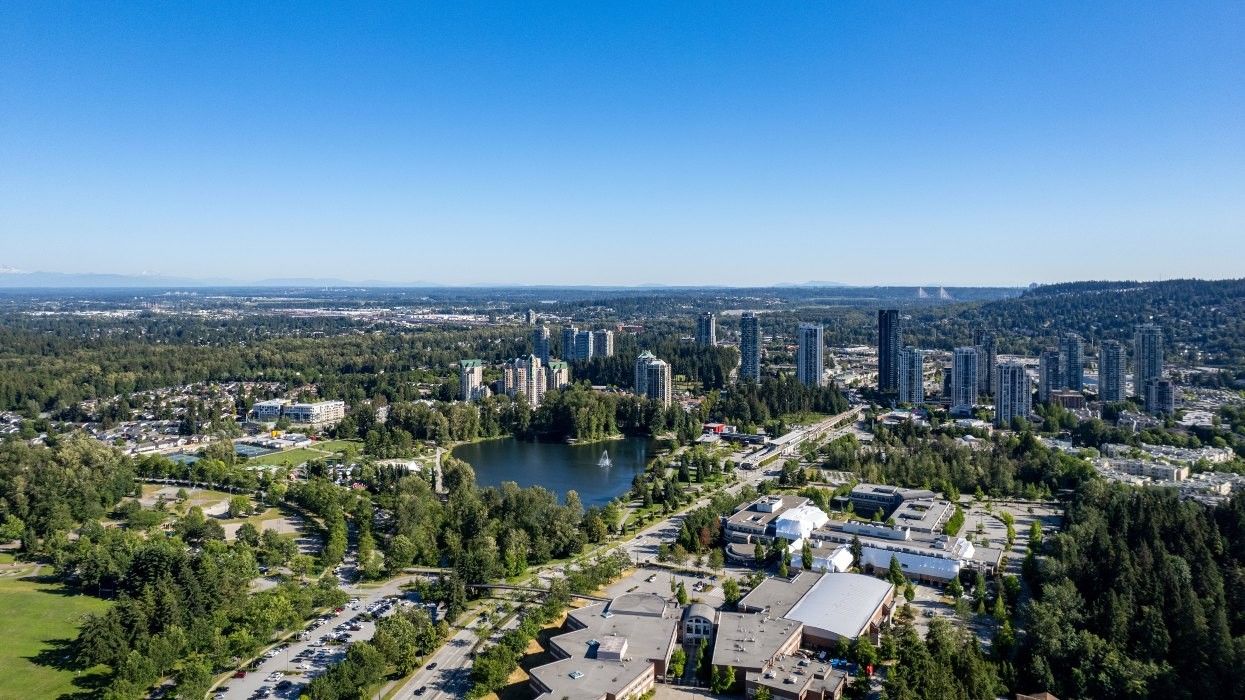As the housing market currently stands, presale purchasers are on the sidelines and condo projects cannot proceed. It thus makes sense for developers to focus on rental projects, but here they are also facing several challenges, such as securing financing.
With housing construction nearly at a standstill, governments across Metro Vancouver have been working on policy changes they hope will provide enough relief to developers in order for projects to move forward and the pipeline of new housing to start moving again.
In Coquitlam, Council considered two big items this week in service of that goal: a series of changes to its Rental Incentive Program and a temporary discount on density bonuses.
The Rental Incentive Program
The Rental Incentive Program was created in 2017 and grants bonus floor area for rental projects in zones designated for medium or high levels of density, depending on zoning and the specifics of the project. The City says that the incentive resulted in developers advancing 8,958 units as of April 2024, of which 855 have been completed and 1,513 were under construction.
In February 2024, the City reached an agreement with the federal government for $25 million from the Housing Accelerator Fund. As part of that agreement, the City said it would evaluate and expand its Rental Incentive Program. That work has not been able to properly commence, because of the suite of legislation introduced by the Province, until now.
The City's review of the Rental Incentive Program originally had six prongs. One was to define below-market rent as at least 25% below market, which was previously approved by Council. Another was to simplify the density bonus program, which is now "obsolete" due to provincial legislation (and will be restructured, rather than simplified).
What remains is now four prongs, the first of which is to "Provide policy guidance on unit types and mix in multi-unit and mixed-use buildings." Towards this, City staff have proposed the creation of a new Housing Mix Policy. Currently, housing mix requirements, such as the 10% three-bedroom target, are informal and voluntary, and staff say a formal policy could bring more consistent results. No formal policy has been outlined yet, but staff say a draft can be expected this summer.
The second prong is to "Encourage 100% rental housing in medium-density projects." Currently, medium-density 100% rental projects in RM-2 and RM-3 zones are eligible for a 10% density bonus. However, as a result of the new transit-oriented areas legislation (Bill 47), "the Province has expanded areas eligible for medium-density development near transit" and the legislation "effectively voids the City's existing rental incentive tool in medium-density areas as the new minimum exceeds previous densities." Staff are thus working on a new incentive for medium-density projects and this work is expected to complete later this year.
The third prong is to "Revise rental incentives in high density zones to deepen levels of affordability and/or expand below-market units." Details about this are also scarce at the moment, but the City says the existing incentive has also essentially been voided as a result of Bill 47 and that the City is exploring potential options. Work on this front, including consultation with the development industry, will continue this year, but not be completed until 2026.
The last prong is to review the existing Affordable Housing Reserve Fund (AHRF) and its criteria. Again, the City says provincial legislation "necessitate a complete overhaul of the City's development finance framework, eliminating the ability to continue funding the AHRF through Density Bonus revenues in the same way." Staff say the review "may include updates to eligibility requirements, funding priorities, contribution levels, and opportunities for deeper affordability, with the aim of improving clarity and aligning with the evolving housing policy landscape." A new proposed framework is expected to be presented in the fall.

Density Bonus Discount
The changes to the Rental Incentive Program have yet to be officially approved, but what was approved this week was a temporary discount for density bonus payments. A density bonus is an optional payment a developer can make to the City in exchange for more density in addition to the base density allowed for a site. The City then uses that money towards capital projects, such as new amenities.
Critically, the dollar amounts are determined at the development permit stage, but not collected until building permit issuance. However, because of the downturn in the market, projects are not proceeding and thus the City is not able to collect the money. As such, staff proposed a temporary 15% discount on density bonus payments. The actual density bonus rates will not be changed. Instead, at the payment stage, the applicant will be granted a 15% adjustment.
This temporary discount will apply to applicants who collect their building permit before July 31, 2025. After that, the City is scheduled to review its density bonus rate schedule, as it does every three months, with the possibility that the discount program be extended another three months. The City says it will continue to monitor the market and land transactions, which are used in part to determine density bonus rates.
"Staff recognize that Density Bonus is an important funding tool for the City's capital program and delivering major amenities to its residents in order to support community growth, however, the current market conditions are creating a challenging environment for developers to deliver housing and the City recognizes these challenges through this adjustment," said staff in a report, adding that it is hard to estimate exactly how much revenue they are foregoing.
During the council meeting this Monday, Councillor Robert Mazzarolo showed visible annoyance with the fact that developers are constantly advocating for different things depending on market conditions. He also said he believes in the economic phenomenon that "prices rise like a rocket and fall like a feather" and that developers will adjust and ultimately be fine even without the discount, which he said was unfair for residents of Coquitlam.
Later on, Councillor Dennis Marsden echoed what many developers have been saying about government fees, which is that if projects cannot move forward, there are no fees for governments to collect.
"At this point in time, we've seen a hiccup, we've seen a stall, and if there's an indication that we can do our part to kickstart that and see development move forward in Coquitlam — when a developer is looking at and saying they can build in Burnaby or Coquitlam or North Van — if we can give them that incentive to move here, I'd like to see that happen. And if that means getting 85% of something, versus 100% of nothing, I'll take the 85%."
Following the discussion period, Council voted 6-1 in favour of authorizing the temporary discount, with Mazzarolo being the only member in opposition.





















